Text & photos- Lily Maynard
Sketches-Michèle M
‘Inconvenient Women’ is one of a series of lectures organised by Venice Allan as part of the
‘We Need to Talk’ tours. Key speakers were Sheila Jeffreys and Nicole Smith. Chaired by Anne Ruzylo, the meeting took place at Camden Town Hall on the evening of Wednesday, June 13th 2018. The event was livestreamed on Facebook, and can be watched on YouTube
here.
To lessen the chance of protests by transactivists the venue was not made public before the event, and the main meeting place, also kept hush-hush until the day, was a nearby branch of COSTA. This seemed like a pretty good start to the proceedings to me.
“You could go straight to the venue if you like, Lily.” Venice offered when I spoke to her on the phone shortly beforehand.
I was horrified. “God, thanks but no. And miss the coffee?”

Venice talks to the press
So thus it was that I arrived in the smoggy evening sun at COSTA coffee on Euston Road to meet with old friends and new for the brilliantly named ‘Inconvenient Women’ talk. I arrived with just enough time for a quick chat with a few people and to down a triple shot Americano.
I’d never been to the spectacular and imposing Camden Town Hall before. There’s so much stylish architecture in London that it’s easy to walk past a building a score of times without really noticing it. And, surprisingly, there wasn’t a transactivist in sight!

Attendees arrive at Camden Town Hall
The first thing that confronted us on entry was a gargantuan Gatsbyesque marble staircase. For some reason I didn’t quite manage to fathom, we weren’t permitted to use this gleaming escalier, but were huddled eight at a time in two small unreliable lifts on either side of the foyer. On first attempt ours went to the top of the building and back down again without opening its doors.
From the lift we emerged into a labyrinth of corridors and then, through an unimposing door, into a huge, spartan, glass-ceilinged chamber, already half filled with inconvenient women and a sprinkling of menfolk.

The meeting room at Camden Town Hall

Attendees wait for the meeting to start

Inconvenient Women – by Michèle M
We shuffled around, we changed seats, we waved at each other. Some chatted excitedly, some waited in quiet anticipation. the room was bright and clean and the acoustics were excellent. Some opened notebooks and fumbled for pens, one woman fed her baby.
Then Anne took the microphone and we were ready to begin.
The first speaker was Sheila Jeffreys.

Left to right – Anne, Nicole, Sheila
Sheila Jeffreys

Sheila Jeffreys @ Inconvenient Women – Michèle M
Sheila Jeffreys taught politics at University of Melbourne for 25 years and is the author of 10 books on the politics and history of sexuality, including ‘The Lesbian Revolution’ coming out on the 29th of August 2018. Her book ‘Gender Hurts’, a feminist analysis of the politics of transgenderism, was published in 2014.
Jeffreys called her lecture ‘The Protection of Men’s Sexual Rights in International Law’.

Sheila Jeffreys & Nicole Smith
“What I’m going to talk about tonight is how important it is to think internationally when dealing with the threat of men’s cross dressing activism- commonly called the transgender rights movement- to women’s human rights. I fear there may not be as much humour in my talk tonight as some might wish because it’s a big, complicated and quite serious subject.”
Jeffreys spoke of how in the UK the feminist resistance to ‘men’s cross dressing rights’ had been growing exponentially in the last year but was concentrated on the tip of the iceberg, the situation in the UK. She suggested that the feminist focus needed to be more international as a variety of important documents which do not have any influence in law- yet- are increasingly promoted as human rights best practice. Jeffreys called this the ‘agenda of gender rights’ and these developments often take place without the knowledge or scrutiny of feminists.
In March 2018 the EU parliament adopted a report calling for the depathologisation of transgenderism and condemning states such as Britain which require medical evidence to support change of gender. ‘Psychiatric consent’ as this is named, argues that transgender people do not have a mental illness yet paradoxically suggests that easy access to medical treatments and surgery should be easily available.
.
So what are the Yogyakarta Principles?

The
Yogyakarta Principles is a 35-page document about human rights concerned with the areas of sexual orientation & gender identity. The Yogyakarta Principles were signed and created in Yogyakarta, Indonesia, in 2007 and were updated in 2017 with 10 extra principles, (the plus 10).
In 1995, a group of cross-dressing men in the USA produced the International Bill of Transgender Rights. It had no standing in law but the demands have now been accommodated in domestic law in many countries through the vehicle of the Yogyakarta Principles which state that:
‘gender identity is understood to refer to each person’s deeply felt internal individual experience of gender’.
The word gender, when placed in front of the word identity, means any person’s belief that they have some essential personality traits normally found in the opposite sex.
Gender identity is a problem for the vast majority of us who have no internal sense of gender and reject the gender stereotypes that feminists have always sought to abolish. The notion of gender identity makes gender- the behaviours of a system of oppression wherein women wear high heels and restrictive clothing and men are seen as assertive and taking up more space- appear to be something natural and inevitable.
The Yogyakarta Principles are signed by human rights campaigners and lawyers, some of whom may feel obliged to sign, or sign without looking at the situation more closely, believing that gender identity is somehow inextricably connected with the rights of women and children, and lesbian and gay rights.
“Hair flicking is very important,” commented Jeffreys sarcastically. “It’s something women do to show men they’re interested in them. Now I haven’t been heterosexual for a long time…”
“People don’t actually change from being heterosexual,” called a heckler from the back of the room. “You’re either heterosexual or you’re not!”
.
.

Kat – by Michèle M
The heckler, I was later told, is called Kat. She was a contestant on ‘Big Brother’ back in 2004, and yes, I did Google her and she was described as “a political activist who tried to bring a wee bit of anarchy to the house”. Evidently she tried to move a fridge of booze into the BB bedroom. That’s all you’re getting from me. No, really. This isn’t ‘Take A Break’.
“I’m often called a straightbian.” shot back Sheila, gesturing towards Kat. “She’s got this ideology that means that anybody who has been anywhere near a a penis isn’t actually a lesbian- which means that 99% of lesbians in the world.. well… it wipes out Adrienne Rich, Mary Daly, Andrea Dworkin…”
Applause and cheers ran through the room, although some women looked unsettled.
“You’re a bit of a cunt…” was Kat’s retort.
The response to this was gasps and angry cries of “Out! Out! Security! Boo!”
In the middle of this confusion, Kate got to her feet and began loudly singing a rousing version of
‘Every Woman can be a Lesbian’ and a few others joined in the chorus to further applause. Kate’s strong and powerful voice was strangely soothing in the general kerfuffle, but no-one seemed quite sure what might happen next.

Inconvenient Women: mother & baby – Michèle M
The film crew in attendance were loving it. Many women were standing up. It all seemed a bit surreal. It struck me as a good time to go to the loo. It also gave me the chance to coo over a cute baby at the back of the hall.
On the way through the halls, I looked out through the vast glass windows over the network of rooftops that comprised the top of the Town Hall and reflected on how fun it would be to hop out onto the roof and try to see the view of the street below. (The fearless Julia Long, I later discovered on Facebook, realised this dream.)
When I came back things seem to have calmed down.
Sheila was reminding the women present that it was Eleanor Roosevelt who managed to get ‘sex’ included as a protected category at the United Nations in 1946, and pointing out that in most languages the word ‘gender’ doesn’t even exist.
“Sex is biology and it’s on the basis of biology that women are oppressed: it’s on the basis of biology that women have gained rights and become a protected category… the idea of gender arises from the oppression of women and cannot exist without it.”
Activists are very keen to see more women and children transition, said Jeffreys, because ostensibly if children are doing it it can’t be about sex and if women are doing it, it can’t be about male fetishes.
This made total sense to me. The plethora of late transitioning males on Twitter, so concerned that kids’ gender identity should be respected, has always seemed strange. Wouldn’t it be great if these men were as concerned about children going hungry, missing education and living in sub-standard housing as they are about giving them access to hormone treatments & irreversible non-medical surgeries? But I digress.
Jeffreys pointed out that lesbians are not attracted to women because they are feminine or because they wear make-up, hair flick & walk with small steps but because they are women- biological women.

Sheila Jeffreys by Michèle M
“As a lesbian feminist I am extremely aware of the need for the protection of the rights of lesbians- and gay men- internationally… these rights need to be separated off from the rights of heterosexual male cross dressers if the rights of lesbians and all other women are to be protected…. we are going to end up with the stereotypes as acted out by men for sexual purposes protected in national and international legal systems.”
In 2000 Jeffreys attended CEDAW – the Convention on the Elimination of Discrimination Against Women. She says that many religious organisations are able to attend because they have access to large amounts of money, yet there may be, for example, just one woman representing the whole of West Africa because of insufficient access to funding.
Until 2007 lesbian and gay organisations were unable to attend. Jeffreys attended one meeting where the church had brought along schoolboys who were sat at the back of a lesbian and gay talk, “clicking their rosaries with terror”. The idea that homosexuality was the result of men and women having the brains of the opposite sex mysteriously transplanted into their bodies has always been furiously rejected by the gay liberation movement and lesbian feminism.
The Yogyakarta Principles combined sexual orientation and gender identity so closely that they now have one short acronym which incorporates both: SOGI. This language is now being used all the time. With what result? Well, firstly, women are not in any way advantaged by this. As Jeffreys puts it:
“Lesbians in South Africa are relentlessly raped and murdered and the state ignores any responsibility, and right now we cannot campaign to support them without promoting the right of heterosexual male cross dressers to take over women’s spaces and opportunities.”
Jeffreys concluded by saying how important it is that women should attend the next CEDAW, if possible by joining a woman’s organisation that already challenges trans rights, which few do, and is an recognised NGO (non-government organisation) able to send representatives to CEDAW. Another option would be setting up an organisation of our own so we can apply for accreditation with CEDAW, which is not too complicated, and go there to challenge the trans-push. While the well-financially supported trans and gay organisations and churches find attending no problem, travelling to and staying in New York would be very expensive without funding. In Europe, Jeffreys suggests we need to be lobbying our MPs and the women’s groups in the European Parliament.
“I’m open to many, many other suggestions,” she concluded, “because I think we are in an urgent situation.”
Bursts of applause and a cry of “I love you, Sheila!” greeted the conclusion of Jeffreys’ talk.

When the applause had died down, Ruzylo took the microphone to announce the next speaker.
“Our next speaker is Nicole Smith. She is a student and feminist activist.”
Nicole Smith

Nicole Smith @Inconvenient Women – Michèle M[
“The TERF had repeatedly maintained, in conversation, that transgender ideology is stuffed with such madness, nonsense, and contradictions, that (s)he admired the world in being so long deluded by it.”
In 1697, Smith told us, 20 year old Thomas Aikenhead became the last person in the UK to be executed for blasphemy. Now, she says, the idea of blasphemy is replaced with the idea of ‘hate speech’ when organisations wish to persecute someone whose speech they believe to be ‘unholy’. Jones pointed out the similarities in the passage from the indictment of Aikenhead and read it out, replacing the word ‘prisoner’ with ‘TERF’ and ‘scriptures’ with ‘transgender ideology’.
According to the BBC, Smith reminded us, what women are is a ‘controversial topic’ for women to speak on. Any woman who criticises trans-ideology or the potential forthcoming changes to the Gender Recognition Act, is denounced in a manner reminiscent of the Harry Enfield sketch
‘Women Know your Limits’
Rachel Cohen of Stonewall had replied to Murray: ‘They are women just like you and me… whether you’re trans or not your identity is yours alone. I wouldn’t question your gender identity journey, Jenni, and in return I wouldn’t expect you to question mine or anyone else’s. What right do you have to do so?”
An argument constructed on the sense of a gender that is yours alone, says Smith, cannot be challenged because it is self-referential. She mentions non-binary YouTuber Ash crying on the phone to her mother as she comes out as trans; saying her identity goes ‘beyond clothes and roles’ and is ‘just like an internal sense’. Of course, her mother can’t dispute this; no-one can dispute this, in the same way that a Christian purporting to have a personal relationship with God cannot be challenged. The only evidence is their own conviction.
Currently to get a gender recognition certificate (GRC), you need to ‘live as’ your desired gender for two years and sign a form saying you intend to live that way forever. Children are supposed to be ‘consistent, insistent and persistent’ before they are diagnosed as ‘trans’. Changes to the act would mean that self declaration of identity is sufficient. Faith is all! Yet in theory, if it takes nothing to be transgender, surely the government doesn’t have to give anything to transgender people?
Smith calls the changes to the law “ill conceived”. If a resource is available to anyone who identifies as x, the resource is available to everyone. Gender Identity is a faith-based claim, evidenced only by your own conviction and like notions of the soul or the holy spirit, it is not scientifically verifiable.

Smith – Michèle M
“The use of preferred pronouns is a dynamic involving tacit agreement on the part of the oppressed that the subjective interpretation, no matter how removed they are from our reality, are in fact correct… to most women, cis is as onerous distortion of the truth as is Eve having come from Adam’s rib… when you operate under faith you are immunised from standard methods of reason.”
“Together,” concluded Nicole, “we must resist the modern day scripture that is gender ideology.”
After the claps and cheers that greeted the end of Nicole’s talk we had a short break before people were invited to speak from the floor.
“I know there are a number of women in this room who would like to ask some questions and speak,” said Anne, “if anybody would like to be on the live stream.. come up here.. please go through me, I will be quite strict but try to fit in as many women as possible.”
.
I should put in here that I haven’t been able to write about all the women who spoke in the second half of the evening. If you want to watch the livestream of the whole event, you can see it here. Apologies to those I’ve left out. The power and commitment with which you spoke was inspiring.
.
Kate spoke first and expressed her admiration for Sheila Jeffreys. She spoke of the fetishisation of oppression and pornographic interest. SKate described herself as a ‘lifelong lesbian’ and she knew women who were lesbians who had decided to get married and lesbians who had been married before they became lesbians. She objected to the phrase ‘sexual orientation’ and claimed that the idea of ‘born this way’ had been developed to silence the church.
Mumbles of dissent came from the back of the room, but nothing discernible.
.
Magdalen Berns was introduced to cheers, interspersed with a few shouts from the back.

Magdalen Berns – Michèle M
Magdalen began speaking about having got in trouble for ‘safe space’ violations at Edinburgh University but was interrupted again.
“Lesbians! Sexual orientation!” called someone from the back, or at least that’s what it sounded like to me. I suspect it was Kat again, but I couldn’t be sure. It might have been ‘Lesbian isn’t a sexual orientation.”
“I’m not talking about that,” replied Magdalen, exasperated, when she was heckled for the third time. “Can you stop shouting at me? I’ve got a microphone and you haven’t, so I’m gonna be much louder than you!”
This was met with loud cheers from the audience, who were obviously hoping to hear what Magdalen had to say- and hear it they did.

Magdalen Berns
Berns raised her voice so she could be heard over the rumblings at the back, and said that we need to be making connections with women all over the world, because there are massive numbers of women pushing against ‘this nonsense’.
She suggested that we need to find out what’s going on in their countries, and we need to unify women all over the world. We mustn’t get picked off one by one: we need to make sure we are resisting internationally, using all kinds of media to get our message across and to act as a collective. She suggested we meet up locally more often, and set up local groups to fight trans-ideology together.
.
.

Lisa – Michèle M
Lisa spoke next. She said she felt that UK women are well placed to win this battle. The laws we have concerning intersectionality are laws women demanded concerning violence and abuse and when women stand up and demand to be listened to, we are invincible.
“We already have the laws. We just need to make sure they’re fucking applied. Transactvism is narcissistic abuse.”
Bettina told us about ILAW (International Legal Action for Women), an new organisation, recently set up with a plan to stop the Human Rights Act being corrupted.
Stephanie Davies-Arai from Transgender Trend told how the replacement of the word ‘sex’ with ‘gender’ is being led by Stonewall in schools.

Stephanie Davis-Arai – Michèle M
Stephanie Davis-Arai – Michèle M
She spoke of how homosexuality is being defined by Stonewall and transgender groups as an old fashioned medical term – gay is now described as attraction to the same ‘gender’ rather than the same sex. In the Stonewall and GI schools’ resources and anti- bullying materials, sex is replaced by gender.
The erasure of biological sex is the erasure of the female sex because male is the default, & likewise homosexuality is erased but heterosexuality is not, as heterosexuality is the default.
This ideology is being led by Stonewall & the transgender youth ‘support groups’ springing up all over the country. In schools children are being indoctrinated into the idea, from the start, that whether you are a boy or a girl is
‘not a question of biology but a matter of an internal sense of feeling’.
She spoke of the material used to teach these ideas such as the genderbread person and the gender unicorn and the Allsorts Toolkit that promotes this ideology, and emphasised the importance of the accessibility of alternative resources.

Davies-Arai referred to the
‘tsunami of harassment, abuse and defamation online’ against her personally, and against Transgender Trend, when they released their schools pack (I wrote about this extensively
here)
She noted that no actual body, not the Department of Education, not the Equality & Human Right Commission, no teaching union nor human rights organisation, has actually denounced the Transgender Trend resource, despite concerted attempts by activist organisations to get them to do so. The reason for that, she suggests, is that it clearly explains the difference between sex and gender and nobody can argue against what it says.
When the Crowdfunder was started, the harassment and complaints increased. She thanked those who wrote to Crowdfunder asking for the project to be reinstigated. After six days of investigation,
‘… we were cleared of hate. There is not hate in this document, there is only truth. This was a massive victory, for truth and reality, and the protection of children.’
Stephanie concluded by thanking those who had supported the resource and saying- to resounding cheers- that the money raised from the Crowdfunder, over £10,000 to date, would help get the resource pack into every school in England.
Posie Parker, self described as ‘blunt, brutal and belligerent’ spoke about the importance of free speech and the right of free expression.

Posie Parker- by Michèle M
“Americans under Trump have more freedom to speak than you do.. objective justice has been sacrificed at the altar of the individual. ‘I’m offended’ is the new shut up, don’t speak, be silent. If we have no right to offend we lose the ability to speak freely, to share and evolve important ideas.”

Parker pointed out that organisations like Mermaids and GIRES want the law to be used to stop ‘misgendering’. This means that in theory a woman could be charged with a crime for objecting to seeing a man’s penis in a female changing room. She said she had been told by the Somerset police that a male police officer who identifies as a woman could search a female suspect. She suggested we contact local forces and demand FOIs to see what the policy of our local force is.
“Beneath this mask of progressive, liberal thinking, hides misogyny.”
Posie spoke of the social consequences and disciplinary hearings that are so often the result of women speaking the truth. She suggested that we go to our children’s schools and ask what they’re teaching; ask our local police forces, local councils and local hospitals how much money they’ve spent on diversity training.
“The road to tyranny begins with small steps. Controlling language is the first, second is your thoughts and before you know it much of the truth we know will remain unspoken.”
.

Joani Walsh – Michèle M
Joani Walsh raised the subject of the announcement that the British Film Institute planned to use transgender model and activist Munroe Bergdorf to headline their women’s festival (boos) and suggested that we protest it (cheers).
Elizabeth, an environmentalist, spoke about big pharma and oestrogenic pollution, due not only to trans, but HRT & the pill. She spoke of various other hormones that are endangering the oceans.
Sheila was asked if she had anything else to say. She said that the phrase ‘sexual orientation’ was a problematic phrase and dangerous because anything- for example paedophilia- can be added on to it.
When asked what we should say instead, Sheila suggested that ‘lesbian and gay’ worked perfectly well.
Sheila also pointed out that lesbian & gay right organisations now get huge amounts of money from promoting transgenderism and their focus has been diverted: now they can’t give up supporting or promoting trans ideology because their funding will be cut.
“We have nothing but our rage, which is going to have to be good enough for the moment.” she concluded.
Someone mentioned that Mumsnet had brought out a list of phrases and words that would no longer be allowed and speculated as to how it would be possible to get round this. TIM and TIF had been banned, although so have the words cis and TERF. Sheila replied that TIM seemed a perfectly respectable acronym to her, and that the shutdown showed the power of patriarchy to control our language.
“Get the L out!” shouted a voice from the back. “Get the L out of LGBT!”
A woman spoke who had been part of the mass resignation from the Labour party. She said Labour had phoned her and asked her to reconsider her resignation. When she told them she had raised thousands of pounds for them in the past but had left over their support for the changes to the GRA, they put the phone down on her. She spoke about how her own body dysphoria was a result of repeated child sexual abuse. She said she could understand how women could want to renounce womanhood and spoke of the barrage of hate and abuse that people who are openly gender critical receive.
Claire spoke about the Girl Guides and how a boy who identifies as a girl will be included in the Guides but a non-binary identified girl would be directed to join another organisation. “We shouldn’t allow this organisation to turn these girls away!” She pointed out that male trans-identified leaders can take on all the female role in the organisation, including overnight stays and chaperoning, and how this should be a safeguarding issue.
Another woman asked if anyone wanted to buy her badges.
‘There’s always one,” quipped Anne.
“Well, I’m skint,” she laughed.
The Conservatives are as guilty as Labour of supporting the transagenda, another said.
Another suggested that the media and elite culture would soon discover how terrible some of these organisations are and that hopefully our laws will prove fit for purpose and protect children.
A woman who worked in Brussels as a feminist lobbyist in 1991 said at that time the Labour Party Women’s Officer became a Gender Officer & EU Women’s Rights Unit was changed to the European Women Gender Equality Unit – and within a year both posts were filled by men. These men had no shame, no conception that this was a problem.
This ongoing change of words is another opportunity for men to get women to shut up.
Another spoke about ‘deadnaming’ and of a feminist campaign in America to stop any man who’s committed a crime against women or children changing his gender. This was met with cheers from many, although to me it seemed a bit of a double standard: gender identity shouldn’t be a prize for good behaviour, nor a reward to be handed out for not molesting people.
Someone asked Sheila if she would go to CEDAW. again She said she’d love to go but women really need to go as part of organisations. She said there were many older women working there, some in their 80s and 90,s and that we very much needed to be represented.
“We have got to do it and we have got to organise.”
A man said he was struck by the constraint on the use of language made it ‘so difficult to articulate safely and accurately your own ideas’ and how it was something he was really going to go home and think about.

‘Inconvenient Women’ Venice Allan & Anne Ruzylo
Anne Ruzylo spoke of how she resigned as Women’s Officer Labour Party Women’s Officer; despite rumours, she assured us she wasn’t sacked for ‘transphobia’.
“Ive never been phobic and there’s no such thing as trans, so I can’t be guilty of that”.
She commented on how, after having resigned, she was contacted and asked to chair the women’s forum meeting on Friday as the now officer couldn’t make it.
Ruzylo spoke of the high levels of sexual abuse in our culture, and how many young women think that transitioning will help save them from this abuse. She spoke of how Stonewall has always been very corporate but now they all give each other awards. Anne told us she now likes to nickname Stonewall the ‘clitorati’.
“I’ve never seen a hierarchy of lesbians before in my life, if you’ve got money and power you’re put on this little pedestal.”
She suggested that in most LGBT organisations it’s all about the money; there’s a huge investment in trans, it’s all about ‘power and men reinventing themselves’.
“Let’s get the L out of LGBT – let’s get the T out quite frankly, I don’t see why we have to move, it only used to be LG, so let’s get the T out.”
“At the end of last week,” Anne told us, “Myself and some others discovered that councils up and down the country had slipped in gender rather than sex in protected characteristics.”
She urged people to check their own local council policies & write and challenge them. These policies can have devastating effects for some women. If women see refuges are ‘trans inclusive’ they’re stuck. They may not feel safe because if they go to a refuge they’re likely to be alongside a man. Anne told us that for 8 years, Cambridge’s policy has included gender not sex: this isn’t acceptable.
Finally, Anne paid tribute to Venice, who, she said, “does everything on her own & it’s absolutely remarkable.”
Venice said “I think we’ve had a great meeting; I think we’ve had enough. When the livestream goes off I’ll tell you where were going if you’re still up for a drink and a chat. Thank you so much to the venue… thank you to the women who are here tonight who were here at our first meeting on Speakers Corner. A lot of people on Mumsnet say you have to be brave to come to one of our meetings- I don’t think we’re brave, I just think we’re doing the right thing & we’ve got to keep on doing it…. we need feminist networks in every corner of the country and all over the world.”
“We’ve had seven meetings since September” she concluded, “and tonight there were no protest with activists. We did the meeting, we protected the venue… I’m really pleased.”
She turns to Nicole “What was it you said in your speech? You can’t punch all of us! Goodnight!”

Michèle M sketching
Michèle M spent most of the talk sketching while she listened. I was really glad she’d agreed to do some more sketches for my blog, following on from her excellent work at Transgenderism and the War on Women in parliament earlier this year. Below is a selection of audience members from her brilliant drawings.

So finally, I give you a toast:
“To inconvenient women everywhere! Long may our voices be heard!”
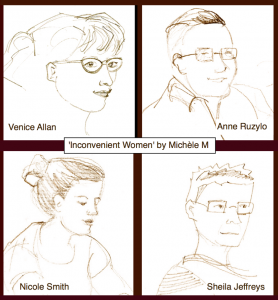

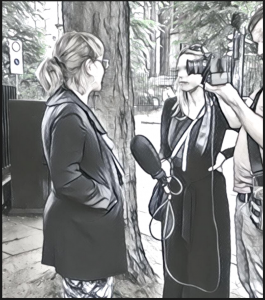
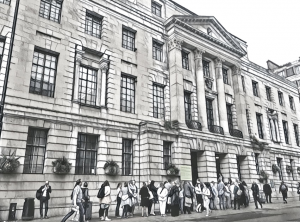
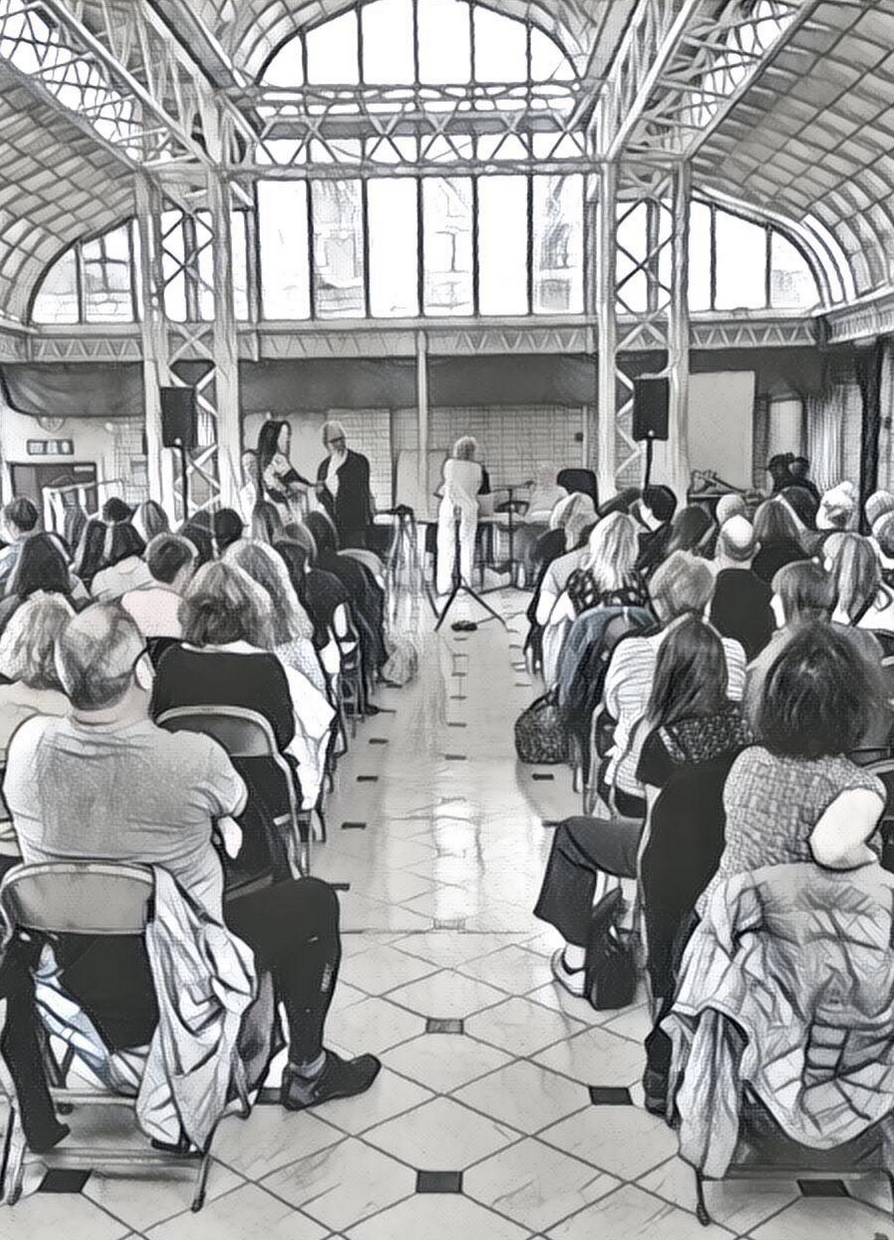
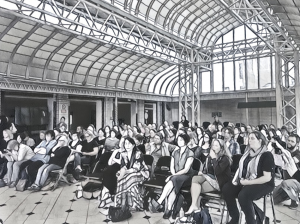
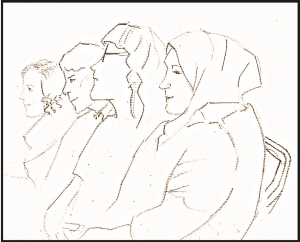
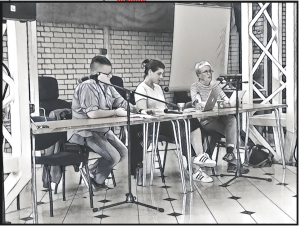
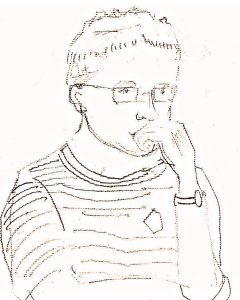
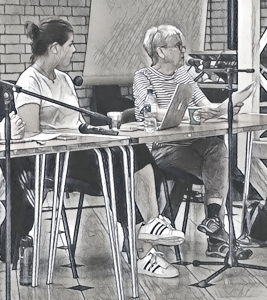
 The Yogyakarta Principles is a 35-page document about human rights concerned with the areas of sexual orientation & gender identity. The Yogyakarta Principles were signed and created in Yogyakarta, Indonesia, in 2007 and were updated in 2017 with 10 extra principles, (the plus 10).
The Yogyakarta Principles is a 35-page document about human rights concerned with the areas of sexual orientation & gender identity. The Yogyakarta Principles were signed and created in Yogyakarta, Indonesia, in 2007 and were updated in 2017 with 10 extra principles, (the plus 10).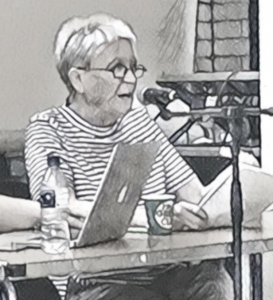


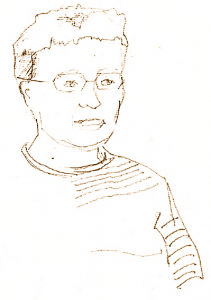
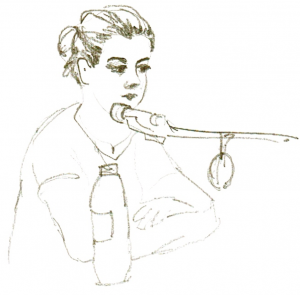
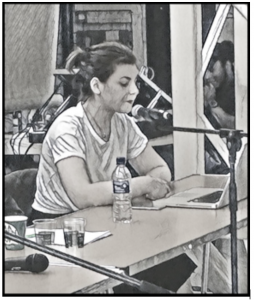


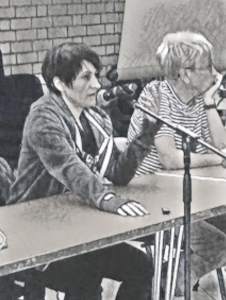

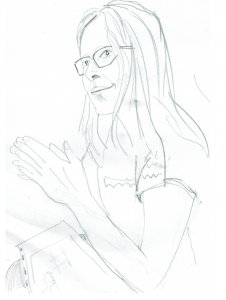
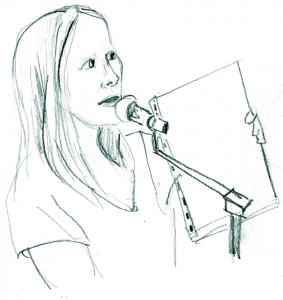
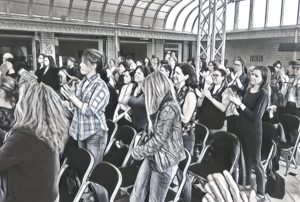
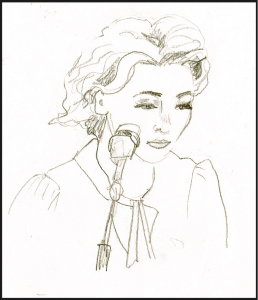
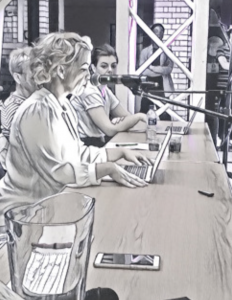 Parker pointed out that organisations like Mermaids and GIRES want the law to be used to stop ‘misgendering’. This means that in theory a woman could be charged with a crime for objecting to seeing a man’s penis in a female changing room. She said she had been told by the Somerset police that a male police officer who identifies as a woman could search a female suspect. She suggested we contact local forces and demand FOIs to see what the policy of our local force is.
Parker pointed out that organisations like Mermaids and GIRES want the law to be used to stop ‘misgendering’. This means that in theory a woman could be charged with a crime for objecting to seeing a man’s penis in a female changing room. She said she had been told by the Somerset police that a male police officer who identifies as a woman could search a female suspect. She suggested we contact local forces and demand FOIs to see what the policy of our local force is.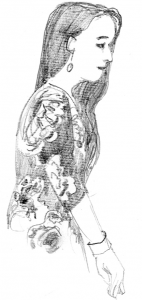
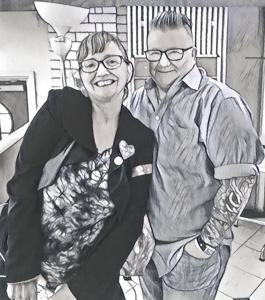
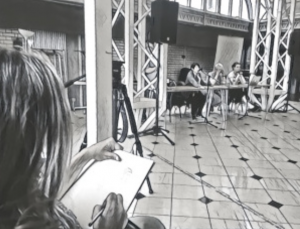
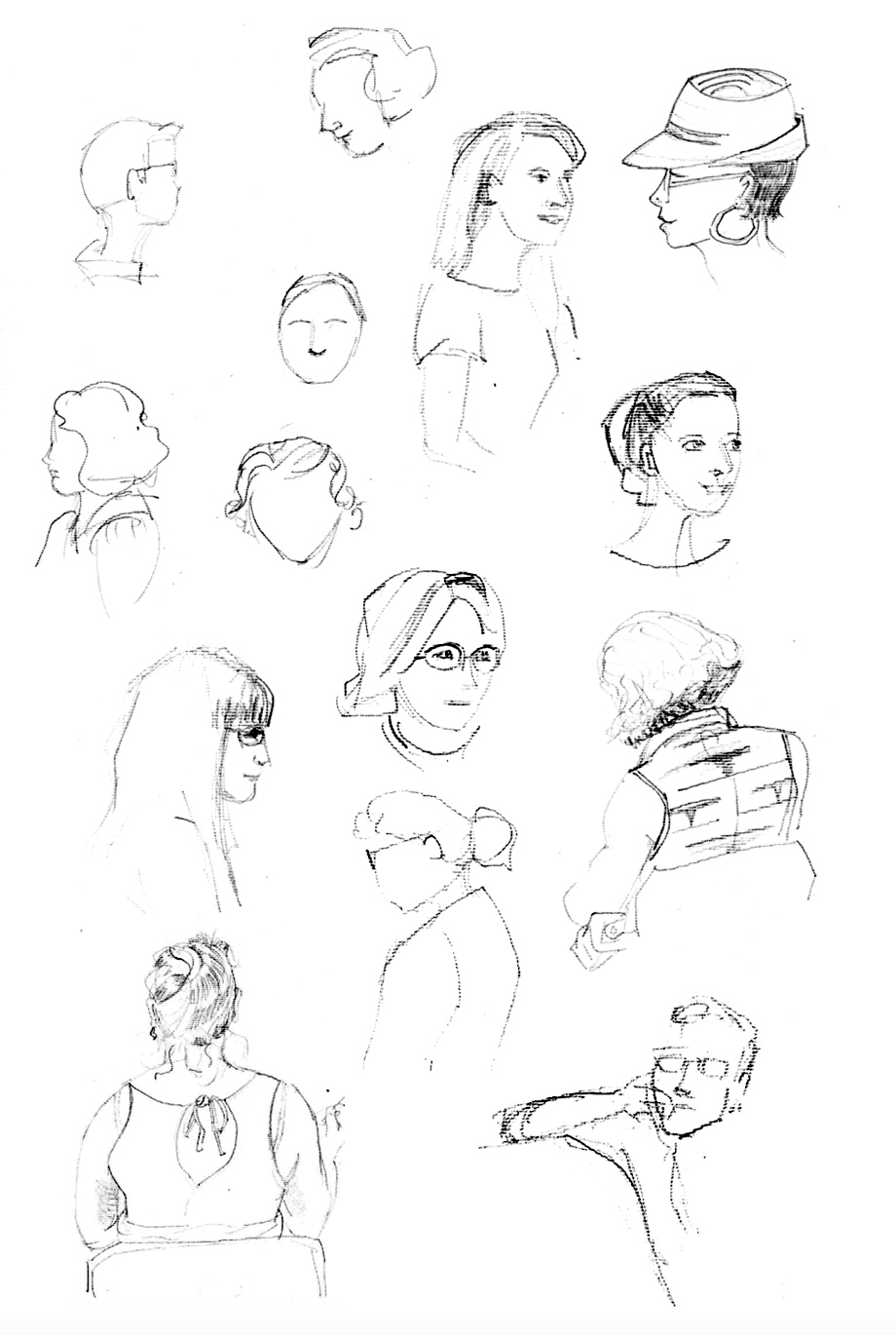

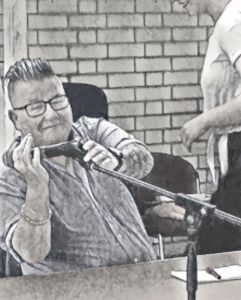
Wow what a fantastic write up! Thank you!!
Brilliant write up, thanks for this!
Well done!